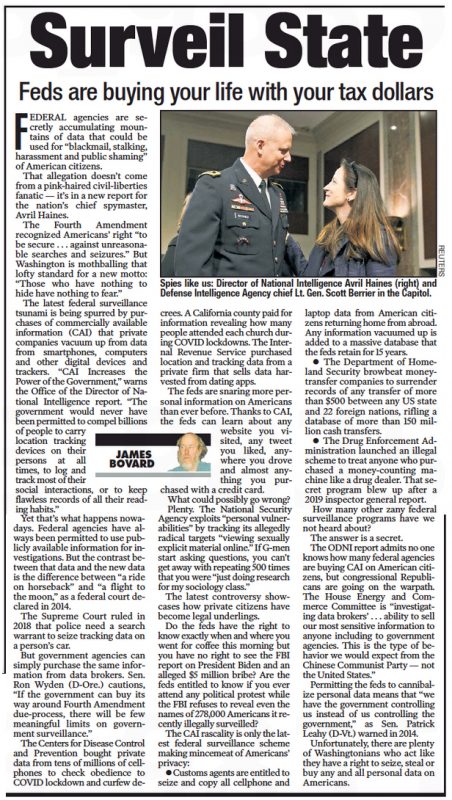LISTEN TO THIS ARTICLE:
New York Post, June 20, 2023
The feds are buying mountains of your personal data and one day  could use it against you
could use it against you
by James Bovard
Federal agencies are secretly accumulating mountains of data that could be used for “blackmail, stalking, harassment and public shaming” of American citizens. That allegation doesn’t come from a pink-haired civil-liberties fanatic — it’s in a new report for the nation’s chief spymaster, Avril Haines.
The Fourth Amendment recognized Americans’ right “to be secure . . . against unreasonable searches and seizures.” But Washington is mothballing that lofty standard for a new motto: “Those who have nothing to hide have nothing to fear.”
The latest federal surveillance tsunami is being spurred by purchases of commercially available information (CAI) that private companies vacuum up from data from smartphones, computers and other digital devices and trackers.
“CAI Increases the Power of the Government,” warns the Office of the Director of National Intelligence report. “The government would never have been permitted to compel billions of people to carry location tracking devices on their persons at all times, to log and track most of their social interactions, or to keep flawless records of all their reading habits.”
Yet that’s what happens nowadays.
Federal agencies have always been permitted to use publicly available information for investigations. But the contrast between that data and the new data is the difference between “a ride on horseback” and “a flight to the moon,” as a federal court declared in 2014.
The Supreme Court ruled in 2018 that police need a search warrant to seize tracking data on a person’s car. But government agencies can simply purchase the same information from data brokers. Sen. Ron Wyden (D-Ore.) cautions, “If the government can buy its way around Fourth Amendment due-process, there will be few meaningful limits on government surveillance.”
The Centers for Disease Control and Prevention bought private data from tens of millions of cellphones to check obedience to COVID lockdown and curfew decrees. A California county paid for information revealing how many people attended each church during COVID lockdowns. The Internal Revenue Service purchased location and tracking data from a private firm that sells data harvested from dating apps.
The feds are snaring more personal information on Americans than ever before. Thanks to CAI, the feds can learn about any website you visited, any tweet you liked, anywhere you drove and almost anything you purchased with a credit card.
What could possibly go wrong?
Plenty. The National Security Agency exploits “personal vulnerabilities” by tracking its allegedly radical targets “viewing sexually explicit material online.” If G-men start asking questions, you can’t get away with repeating 500 times that you were “just doing research for my sociology class.”
The latest controversy showcases how private citizens have become legal underlings. Do the feds have the right to know exactly when and where you went for coffee this morning but you have no right to see the FBI report on President Joe Biden and an alleged $5 million bribe? Are the feds entitled to know if you ever attend any political protest while the FBI refuses to reveal even the names of 278,000 Americans it recently illegally surveilled?
The CAI rascality is only the latest federal surveillance scheme making mincemeat of Americans’ privacy:
- Customs agents are entitled to seize and copy all the cellphone and laptop data from American citizens returning home from abroad. Any information vacuumed up is added to a massive database that the feds retain for 15 years.
- The Department of Homeland Security browbeat money-transfer companies to surrender records of any transfer of more than $500 between any US state and 22 foreign nations, rifling a database of more than150 million cash transfers.
- The Drug Enforcement Administration launched an illegal scheme to treat anyone who purchased a money-counting machine like a drug dealer. That secret program blew up after a 2019 inspector general report.
How many other zany federal surveillance programs have we not heard about?
The answer is a secret.
The ODNI report admits no one knows how many federal agencies are buying CAI on American citizens, but congressional Republicans are going on the warpath.
The House Energy and Commerce Committee is “investigating data brokers’ . . . ability to sell our most sensitive information to anyone including to government agencies. This is the type of behavior we would expect from the Chinese Communist Party — not the United States.”
Permitting the feds to cannibalize personal data means that “we have the government controlling us instead of us controlling the government,” as Sen. Patrick Leahy (D-Vt.) warned in 2014.
Unfortunately, there are plenty of Washingtonians who act like they have a right to seize, steal or buy any and all personal data on Americans.
James Bovard is the author of 10 books and a member of the USA Today Board of Contributors.

Well, gee, duh. Don’t use a “smartphone”. Don’t buy a new car with a computer in it. And don’t use YouTube/Google. Use cash not credit cards. Don’t fly. Opt out. Find a way to live that the Feds can’t track.
I do most of those, and it makes some difference in the number of pieces of information that government thugs have on me. But that’s about a million miles away from “find[ing] a way to live that the Feds can’t track.” Do you file taxes? Visit a doctor? Drive your car anywhere but distant rural areas not covered by ALPRs? Carry any sort of cell phone, smart or dumb, in case you break down somewhere and need to call for a tow? Not to mention, do you ever say anything bad about the motives and character of government officials? The tracking of all these things is scary and not easily dismissed.
agreed
How much of life should people sacrifice for an illusion of impunity from govt. surveillance? I agree there are basic steps people should take.